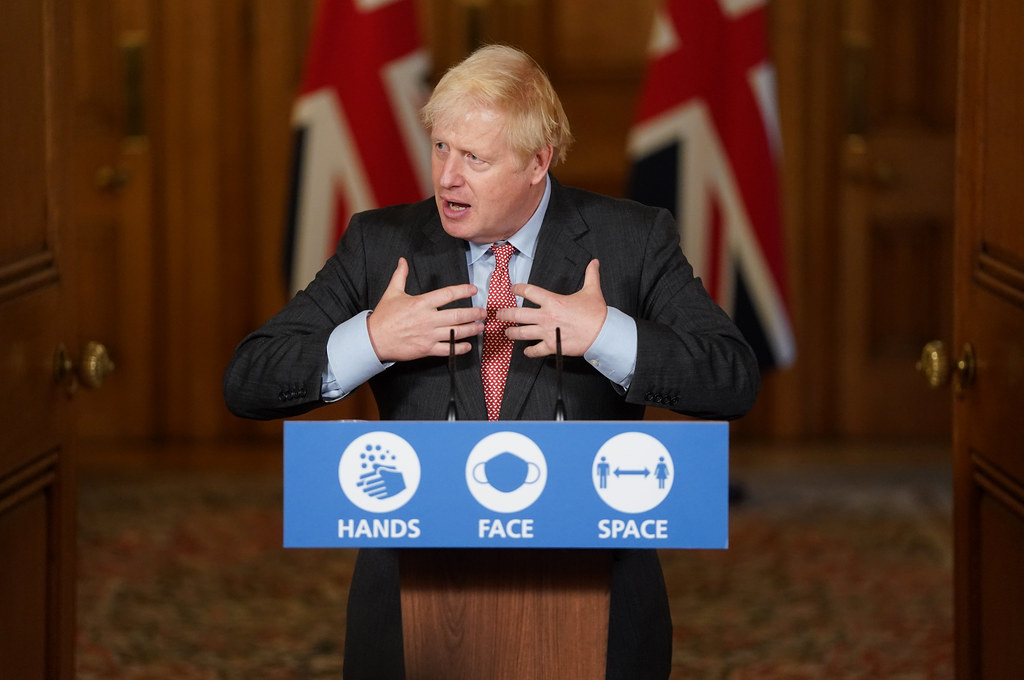When we predicted the top human rights trends to watch in 2020, there was no way we could have anticipated the COVID-19 pandemic that would fundamentally shape the year ahead.
It’s clear that coronavirus will inevitably continue to be one of the biggest rights issues of 2021 – but it’s not the only thing that should be on our radar. This selection of things to look out for – some quite specific and some more general – is by no means exhaustive and, as the last year has shown, there’s no way we can accurately predict the future. However, there are pressing issues on the horizon – here are just a few, in no particular order.
Coronavirus Regulations, Inequalities, And Vaccine Roll-Out
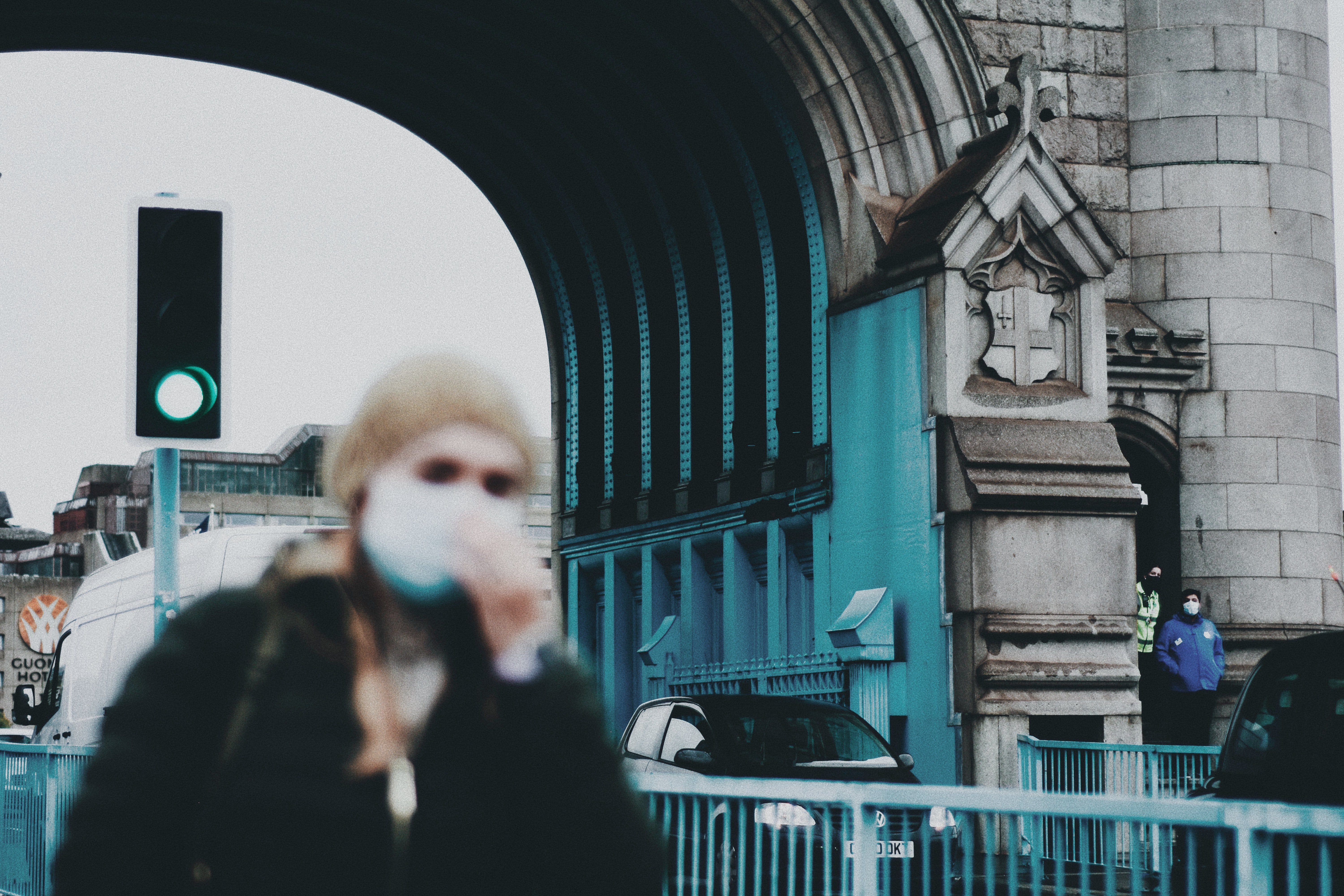
A woman in a mask walks through London. (Image Credit: Unsplash)
Even as 2021 began, the political landscape around coronavirus shifted considerably. Prime Minister Boris Johnson announced a new national lockdown on 4 January, while scientists continue to track the mutations of the virus – a new, more transmissible, variant of which was first detected in September.
By the end of the first week of the year there were further developments – travellers coming to the UK from overseas will now be required to prove they have had a negative coronavirus test and Cabinet Office Minister Michael Gove announced that A-Level and GCSE examinations will not be scheduled this year. However, for University students, the situation is much less clear, with many students across the country expressing their frustrations about being overlooked throughout the pandemic.
There is good news though – with the first dose of the Oxford-AstraZeneca vaccine given to dialysis patient Brian Pinker. The Prime Minister predicts that by the middle of February, ‘with a fair wind’, everyone in the four top priority groups will have been offered their first dose of the vaccine.
The Impact On Our Human Rights
As well as ensuring those most vulnerable are able to gain access to the vaccine, it is important to keep track of the ways in which pandemic regulations will continue to impact our human rights – first and foremost, those to do with health.
Article 2 of the Human Rights Act protects the right to life and means states must make regulations compelling all hospitals to put in place appropriate measures to protect patients’ lives.
Governments must also take steps to ensure the “prevention, treatment, and control” of epidemics and, thanks to the International Covenant on Economic, Social and Cultural Rights (ICESCR), they must also recognise “the right of everyone to […] the highest attainable standard of physical and mental health.” These rights apply to everyone.
However, early in 2020, it was revealed that lives lost to the virus were disproportionately from Black, Asian, and minority ethnic (BAME) communities. Writing in The Guardian, Mayor of London Sadiq Khan said it was an “uncomfortable truth” that people from ethnic minority backgrounds are more likely to live in overcrowded accommodation, “in poverty, or work in precarious and low-paid jobs”.
As we approach the latest peak of this pandemic, it’s vital that we make sure our rights to both physical and mental health are protected, not diminished – and this will be a growing issue for NHS staff.
The British Medical Association (BMA), has called for “a longterm strategy for protecting and maintaining the physical, mental, and emotional wellbeing” of the NHS’ workforce. Meanwhile, a study of more than 10,000 doctors revealed that 45 percent are struggling with depression, anxiety, stress, burnout or other mental health conditions relating to the coronavirus crisis.
It’s clear that as we move forward in 2021, we need to put the right to health at the top of our priorities – along with other rights affected by the pandemic such as those to education and protest.
Deportation Of Rough Sleepers
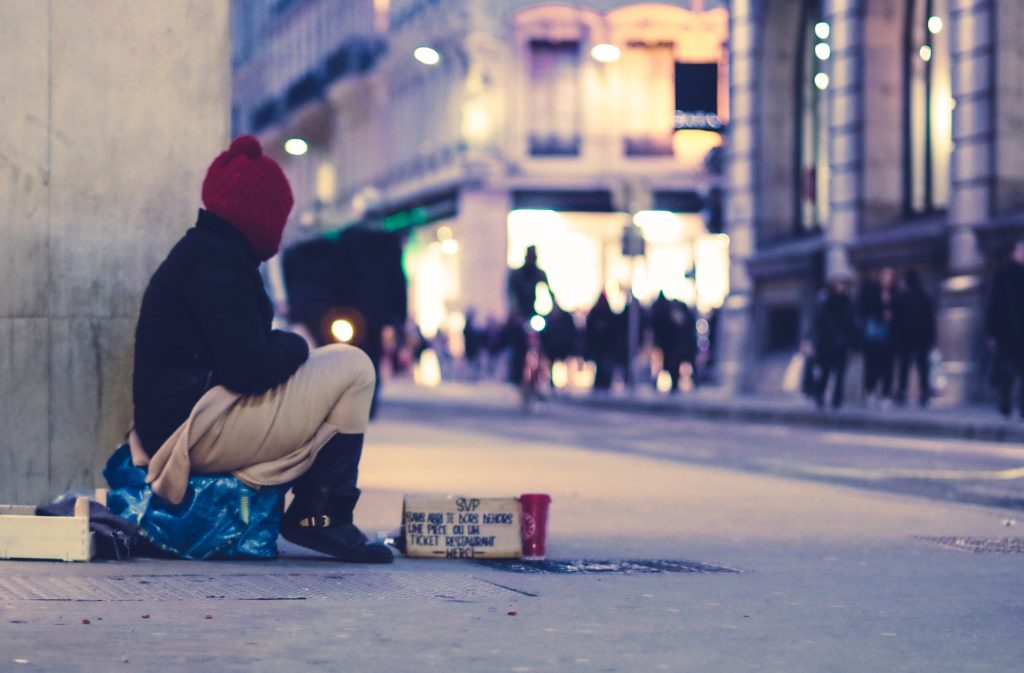
The majority of the UK’s migrant rough sleepers are in London, with about half of those rough sleeping in the capital thought to be migrants. Credit: Unsplash
On 1 December 2020, the Home Office modified the UK immigration rules to deport non-EEA nationals who are rough sleepers, set to be enforced from 1 January 2021.
“Rough sleeping” is defined by the Home Office as “sleeping, or bedding down, in the open air (for example on the street or in doorways) or in buildings or other places not designed for habitation (for example sheds, car parks or stations).”
The move has caused concern across the human rights sector, with Kate Allen, Amnesty International UK’s Director, saying the measure targeted people who are “often already extremely vulnerable, in many cases having been forced onto the streets because of violence or exploitation”.
It is especially appalling that this heartless policy is being introduced during a pandemic, when life for those without a proper place to live is already incredibly difficult.
Kate Allen, Amnesty International
She added: “It is especially appalling that this heartless policy is being introduced during a pandemic, when life for those without a proper place to live is already incredibly difficult.”
Similarly, Jon Sparkes, Chief Executive of homelessness charity Crisis, said it would push people “further into the fringes of society, rather than encouraging them to seek support”.
However, while this was set to be enforced from January 1, Government guidance on the operation of the new rule is still being finalised. Until that is done, the Government will not refuse or cancel a person’s permission to stay in the UK on grounds of rough sleeping.
The issue isn’t likely to go away though – the Greater London Authority refused to cooperate with the Home Office and its “draconian measures”, as well as Haringey and Islington Councils.
Proposed Sex Work Reforms
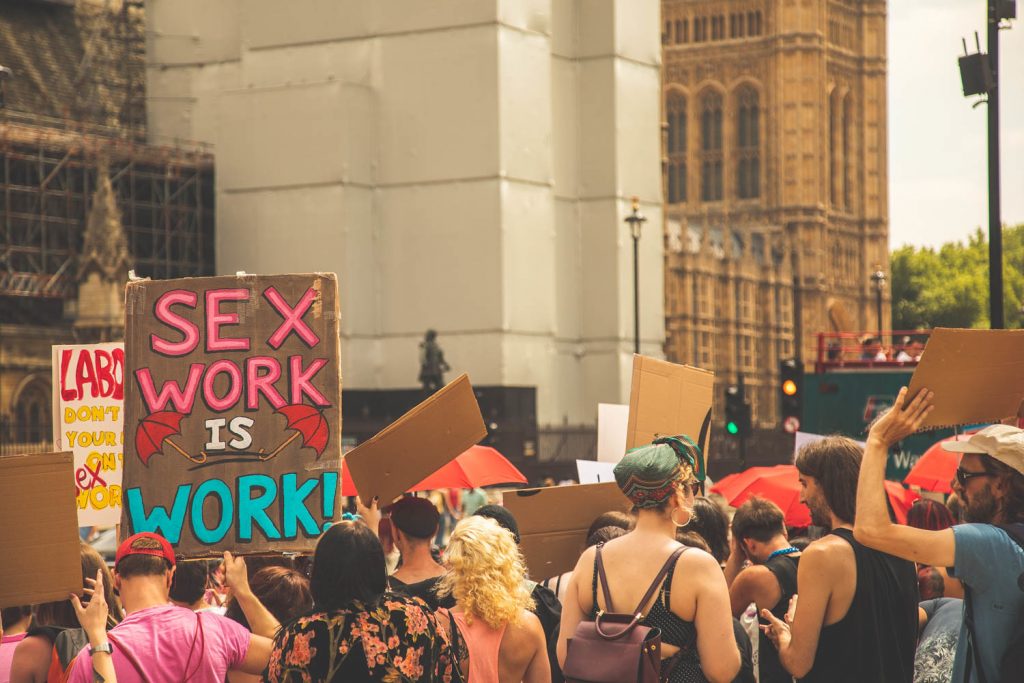
Sex workers demonstrate outside a Parliament in London on the 4th July 2018. Credit: Juno Mac / Flickr
In the last month of 2020, EachOther looked at the potential impacts of the Sexual Exploitation Bill for Britain’s sex workers. The Bill, which is scheduled for a second reading on 5 February 2021, could have huge implications for sex workers.
A private members bill put forward by Labour MP Dame Diana Johnson, if passed, it would decriminalise the sale of sex, while making it a crime for clients to pay for it. It would also create new criminal offences relating to “enabling or profiting” from another person’s sexual exploitation.
Those putting forward the bill argue it will “bust the model of sex trafficking” and dampen demand by punishing buyers. However, the distinction between sex work and sex trafficking is internationally recognised. “The difference is that the former is consensual, whereas the latter is coercive,” the UN’s Global Commission on HIV and the Law said in 2012.
Campaigners have highlighted that the conflation of sex work with modern slavery and trafficking is particularly common when it involves migrant women. To truly tackle exploitation in the sex work industry, as with other sectors, they call for broader reforms to reduce poverty and to increase trust between authorities and vulnerable people.
This also means reforming hostile environment immigration policies which have made trafficking victims fearful of authorities – despite the introduction of modern slavery legislation – as they believe the Home Office wants to remove, deport and detain them. Without tackling these underlying issues, the industry stays underground and only further harms the already marginalised.
Black Lives Matter
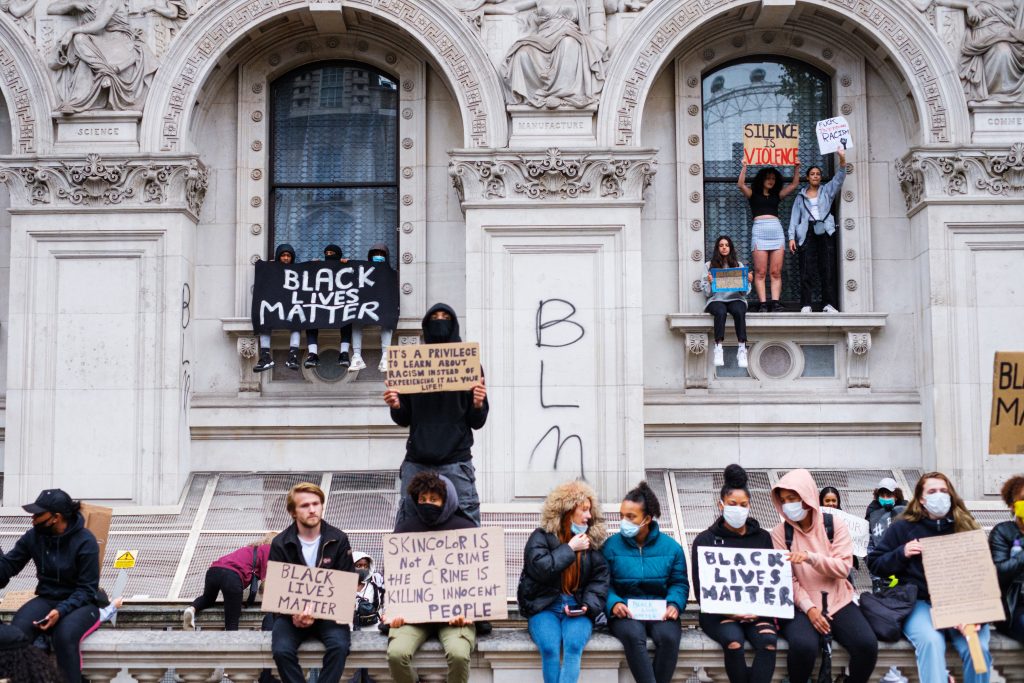
London Black Lives Matter Peaceful Protest from Vauxhall to Westminster. Credit: Unsplash
Protection from discrimination is a human right, enshrined in both British and International Law. In 2020, following the death of George Floyd, an unarmed Black man killed in US police custody, anti-racism protests spread from Minneapolis – his home city – across the globe.
On 3 June, huge crowds could be heard in London’s Hyde Park chanting ‘I can’t breathe’ – the painful last words Floyd uttered as he lay on the ground while a white police officer knelt on his neck for more than eight minutes.
This prompted a reflection on how the UK government and institutional racism continues to negatively impact the lives of Black people today.
In November 2020, a report by parliament’s joint human rights committee found that the Equality and Human Rights Commission (EHRC) lacks the powers, leadership, trust and resources it needs to effectively enforce the rights of Black people.
The report, based on polling data and hearings held in the aftermath of the killing of George Floyd and the Black Lives Matter protests, outlines “stark inequalities” in the protection of black people’s human rights.
“Until the racial disparities in contemporary British society are addressed, the human rights of white people will continue to be better protected, and treated as more valuable, than the rights of Black people,” journalist Nadine Batchelor-Hunt wrote for EachOther.
The Human Rights Act And Judicial Review
The Human Rights Act and Judicial Review are two legal instruments that protect our human rights. However, both could be set for change in 2021.
Judicial Review
Judicial Review is where a person – known as the “claimant” in legal jargon – challenges the lawfulness of a decision, action or failure to act by a public authority.
That includes decisions made (or actions taken or not taken) by local councils, government departments, police forces and health authorities, among others. Last year alone, the threat of judicial review allowed hundreds of thousands of school pupils to have their downgraded grades scrapped, instead taking marks predicted by their teachers. Most of those affected were in disadvantaged areas.
We will end up in the situation where young people are judged by the school’s background and not wholly on their own abilities
Curtis Parfitt-Ford, Campaigned Against A-Level Results
This enables people to go to court to hold government departments and other public bodies to account when they believe their rights have been breached or that they have received unfair treatment.
However, the future of this mechanism remains in doubt, as in 2020, Boris Johnson and Lord chancellor Robert Buckland QC set up a panel of experts tasked with examining the need “for potential reforms to judicial review”.
“This review will ensure this precious check on government power is maintained, while making sure the process is not abused or used to conduct politics by another means,” Buckland said. But many fear this review could be used to weaken, rather than strengthen, a vital way citizens can hold power to account.
Human Rights Act
The Human Rights Act enables us to go to our local courts to enforce our rights – such as our right to free expression or freedom from torture – rather than having to go to the human rights court in Strasbourg. It marked its 20th anniversary of coming into force on October 2 last year.
However, its future is uncertain. In the first week of December 2020, the UK government launched an “independent review of the Human Rights Act”, and the Government also reaffirmed their commitment to updating the act in a letter to Harriet Harman MP, chair of parliament’s joint human rights committee.
The Secretary of State for Justice, Robert Buckland QC, wrote that the update is part of the Conservative Party’s 2019 manifesto pledge to “look at the broader aspects of our constitution, including the balance between the rights of individuals and effective government”.
Previous Conservative Party leaders, dating back to 2015, have pledged to scrap the Human Rights Act altogether and replace it with a British Bill of Rights.
While there’s no way of knowing what will come from these reviews, it’s important to stay vigilant as to how our rights will continue to be protected in the future.
Brexit
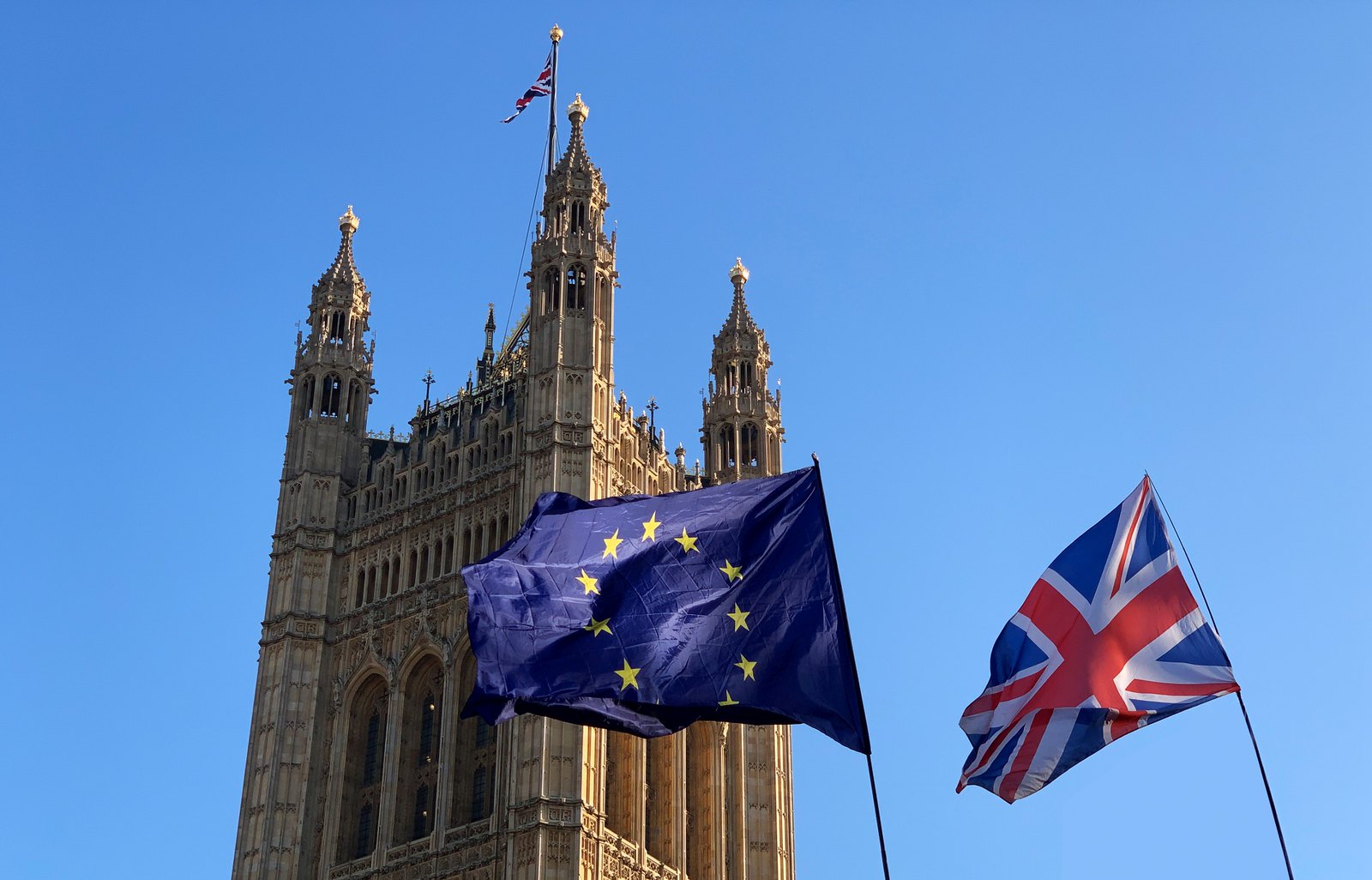
The transition period ended at the end of 2020. Image Credit: Flickr
The UK’s withdrawal from the European Union is now complete, with the transition period ending on 31 December last year. However, our departure from the EU does not automatically affect the UK’s status as a signatory to the European Convention on Human Rights (ECHR), which is an international treaty distinct from the EU, or our ability to take cases to the European Court of Human Rights.
However, it stands in other ways to have a serious impact on our human rights. It will mean that the EU Charter of Fundamental Rights will no longer apply in the UK, watering down the mechanisms available to people here to protect their rights; limiting the facility to update our rights; and leaving gaps in our rights framework, for instance concerning children’s best interests and conscientious objection to military service. Meanwhile, the Prime Minister has failed to confirm the UK will stay within the ECHR at all.
The Withdrawal Agreement Act 2020 also abandoned pledges which appeared in earlier versions of the bill to align with the EU on workers’ rights and environmental protections. Similarly, it watered down legal protections for lone child refugees reunited with family members in the UK. It’s clear Brexit will have huge implications for our rights across all areas of our lives – it’s vital we hold decision makers to account.

